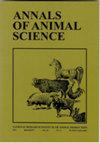The ameliorative effects of dietary rosemary (Rosmarinus officinalis) against growth retardation, oxidative stress, and immunosuppression induced by waterborne lead toxicity in Nile tilapia fingerlings
IF 2.2
4区 农林科学
Q2 AGRICULTURE, DAIRY & ANIMAL SCIENCE
引用次数: 1
Abstract
Abstract The dietary effects of rosemary (Rosmarinus officinalis) leaves powder (RLP) were tested on the performance and welfare of Nile tilapia (Oreochrmis niloticus) fingerlings subjected to lead (Pb) toxicity. Two-hundred fish (31.9±0.28 g) were stocked into 20 85-L glass aquaria (10 fish/aquarium) to represent four treatments with five replicates each. Fish were fed on 0.0% (control; T1) and 1.0% RLP (T2) along with continuous exposure to either 0.0 (T3) or 7.94 mg Pb/L (T4) for 60 days. Compared with the control diet, feeding Nile tilapia on RLP alone improved the growth performance and haemato-biochemical, antioxidant, and immunological indices. Conversely, the Pb toxicity negatively affected hematocrit, hemoglobin, white and red blood cell counts, and growth indices. Furthermore, Pb exposure raised blood cortisol, glucose, total cholesterol, serum transaminases (ALT and AST levels), alkaline phosphatase, and lactate dehydrogenase accompanied with significant reductions in serum total lipids, protein, albumin, and globulin values. Furthermore, Pb exposure decreased respiratory burst, lysozyme, total immunoglobulins, malondialdehyde, superoxide dismutase, catalase, and total antioxidant capacity. On the other hand, dietary RLP significantly reduced the negative impacts of Pb toxicity on the above-mentioned indices. Additionally, the dietary RLP reduced the Pb accumulation in Pb-intoxicated fish leading to significant enhancements in Nile tilapia’s growth and welfare. These findings suggest that dietary 1% RLP could alleviate the Pb toxicity effects on Nile tilapia performance and welfare.饲料中添加迷迭香对尼罗罗非鱼幼鱼水源性铅中毒诱导的生长迟缓、氧化应激和免疫抑制的改善作用
摘要试验了迷迭香叶粉(RLP)对铅中毒尼罗罗非鱼(Oreochrmis niloticus)幼鱼生产性能和福利的影响。将200条鱼(31.9±0.28g)放养在20个85-L玻璃水族馆(10条鱼/水族馆)中,代表四个处理,每个处理5个重复。给鱼喂食0.0%(对照;T1)和1.0%RLP(T2),同时连续暴露于0.0(T3)或7.94 mg Pb/L(T4)60天。与对照组相比,单独用RLP喂养尼罗罗非鱼提高了生长性能和血液生化、抗氧化和免疫指标。相反,铅毒性对红细胞压积、血红蛋白、白细胞和红细胞计数以及生长指数产生负面影响。此外,铅暴露会升高血液皮质醇、葡萄糖、总胆固醇、血清转氨酶(ALT和AST水平)、碱性磷酸酶和乳酸脱氢酶,同时显著降低血清总脂质、蛋白质、白蛋白和球蛋白值。此外,铅暴露降低了呼吸爆发、溶菌酶、总免疫球蛋白、丙二醛、超氧化物歧化酶、过氧化氢酶和总抗氧化能力。另一方面,日粮RLP显著降低了铅毒性对上述指标的负面影响。此外,日粮RLP减少了铅中毒鱼类的铅积累,显著提高了尼罗罗非鱼的生长和福利。这些发现表明,日粮1%RLP可以减轻铅对尼罗罗非鱼生产性能和福利的毒性影响。
本文章由计算机程序翻译,如有差异,请以英文原文为准。
求助全文
约1分钟内获得全文
求助全文
来源期刊

Annals of Animal Science
农林科学-奶制品与动物科学
CiteScore
4.00
自引率
5.30%
发文量
138
审稿时长
6-12 weeks
期刊介绍:
Annals of Animal Science accepts original papers and reviews from the different topics of animal science: genetic and farm animal breeding, the biology, physiology and reproduction of animals, animal nutrition and feedstuffs, environment, hygiene and animal production technology, quality of animal origin products, economics and the organization of animal production.
 求助内容:
求助内容: 应助结果提醒方式:
应助结果提醒方式:


